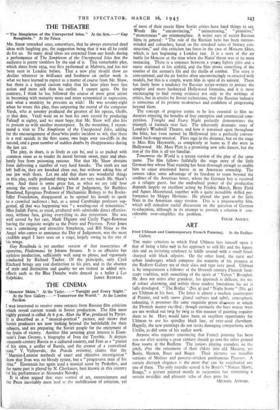AIR. SHAW remarked once, somewhere, that he always extracted dead
ideas with laughing gas, the suggestion being that it was all he could
do for us. So many dead ideas are' extractedfrom our heads during a performance of The Simpleton of the Unexpected Isles that the
audience is pretty toothless by the end of it. This remarkable play, which dates from 1934, was first performed at Malvern, and has not been seen in London before. That a new play should show no decline whatever in brilliance and freshness on earlier work is what we have learned to expect as a matter of course from Mr. Shaw, but there is a legend current today that his later plays have less action and more talk than his earlier. I cannot agree. On the contrary, I think he has followed the course of most great artists in becoming with maturity more and more economical in expression, and what a maturity he presents us with! He was seventy-eight when he wrote this play, thus surpassing the record of the composer Verdi, who at seventy produced the greatest of his operas' Otello, to that date. Verdi went on to beat his own record by producigg Falstaff at eighty, and we must hope, that Mr. Shaw will also live to present us with another masterpiece. In the meantime, I recom- mend a visit to The Simpleton of the Unexpected Isles, adding for the encouragement of thoseswho prefer incident to wit, that there is a real suicide in the first scene, two leaps over sea-cliffs in the second, and a great number of sudden deaths by disappearance during the last act.
The play, in short, is as lively as can be, and is so packed with common sense as to render its moral fervour sweet, pure and abso- lutely free from poisoning rancour. Not that Mr. Shaw abstains from delivering a number of very hard knocks. The teeth are not left half-in, they are knocked clean out, but without taking bits of our jaw with them. Let me add that there are wonderful things in this play, really profound things which are very much Mr. Shaw's - own. And there is some great fun, as when we are told how arming the events on London's Day of Judgement, Sir Ruthless Bonehead, Egregious Professor of Mechanistic Biology to the Rocke- feller Foundation, disappeared as he opened his mouth to speak to a crowded audience ; but, as a noted Cambridge professor sug- gested, all that was happening 'was "a weeding-out of nonentities." Miss Judith Futse, as usual, produced with admirable direct effective- ness, without fuss, giving everything its due proportion. She was well seved by her cast, Mark Dignam and Cecily Paget-Bowman having the requisite _weight as the Priest and Priestess. Peter Jones was 'a convincing and attractive Simpleton, and Bill Shine as the Angel who comes to announce the Day of Judgement, was the most credible angel I have seen on a stage, largely owing to the size of his wings.
Gay Rosalinda is yet another version of that masterpiece elf operettas, Fledermaus by Johann Strauss. It is an effective but styleless production, sufficiently well sung to please, and -vigorously conducted by Richard Tauber. Of the principals, only Cyril Ritchard brings any real distinction to his part, and in the absence of style and' distinction and quality we are treated to added mis- effects such is the Blue Danube waltz danced as a ballet a Les


























 Previous page
Previous page